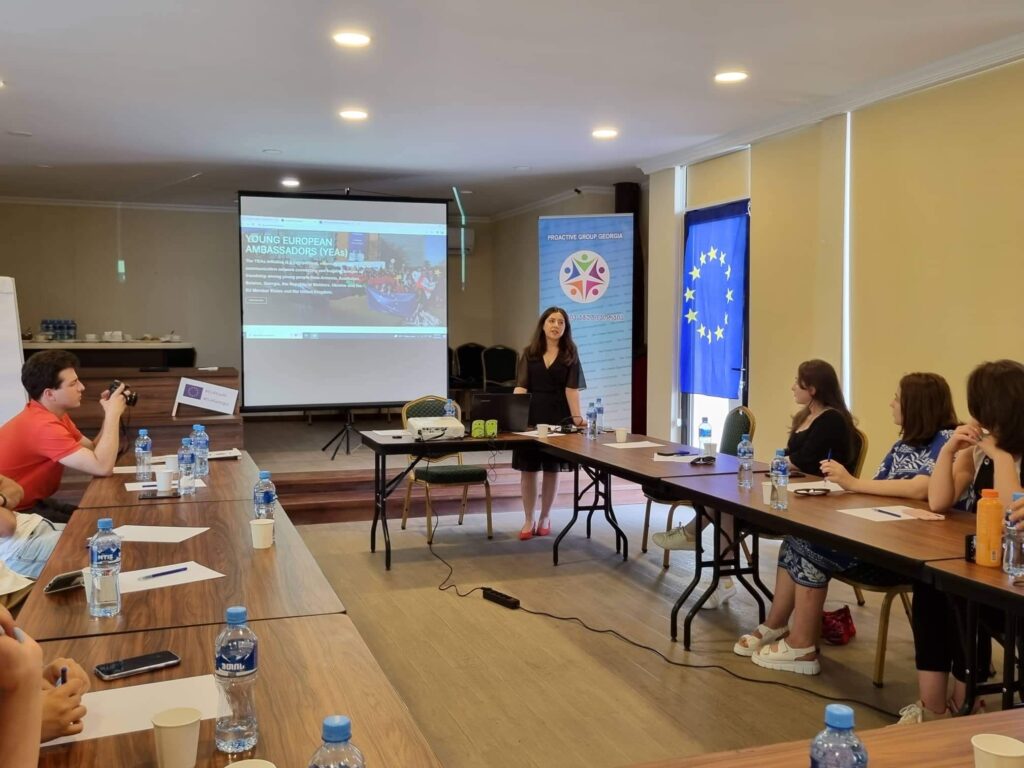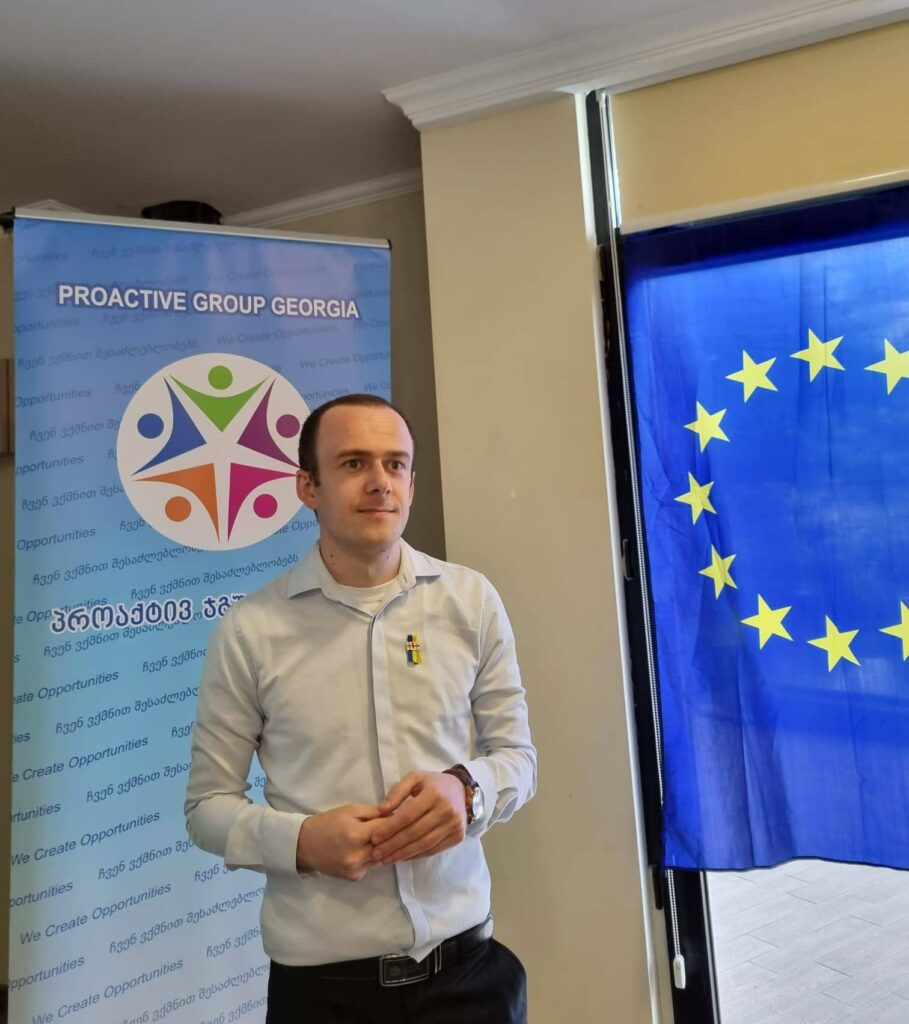
Blog: ‘More EUrope — More Opportunities’ — EU4Youth Alumni spread the word in Georgia
The past few months have seen one of the most dramatic shifts in the security and political calculus in Europe: 2022 has become the year when the European continent was shaken by the largest military invasion since World War II. In parallel to the war in Ukraine, in the very heart of Europe, we have seen widespread disinformation campaigns about the European Union in Eastern Partnership countries, where Russia tries to pervert the EU as a threat to national identity, religion, traditional values, and beliefs.
In the face of Russia’s aggressive anti-western propaganda campaigns, which endanger the democratic development and European integration of the Eastern Partnership region, it is all the more important to promote EU values and the EU’s positive role in the region among vulnerable groups. The ‘EU4Youth Alumni Network’, which brings together approximately 90 young beneficiaries of the Erasmus+ Youth and European Solidarity Corps, EU4Youth grant projects, and the Young European Ambassadors (YEA) Network, can play a vital role in countering disinformation and providing disadvantaged youth groups with accurate information about the European Union and the opportunities it offers to them.
With these objectives in mind, Giorgi Agirbaia, a Georgian member of the EU4Youth Alumni Network, and Lika Merabishvili, a Young European Ambassador from Georgia, in cooperation with partner organisations ProActive Group Georgia, Space for Education and Development and with the support of the European Union in Georgia, and the YEAs initiative, have implemented a six-month-long project “More EUrope – More Opportunities” for 30 young Georgians from socially and economically disadvantaged backgrounds of different regions of Georgia.
The participants of the project became familiar with various aspects of western democratic values and culture and developed leadership qualities and interpersonal skills. The project activities were held both online and offline. One of the most significant activities was a Healthy Lifestyle Campaign, where young people were given information on good nutrition, the importance of daily exercise, adequate sleep, and mental well-being. During two offline training courses, the project participants also got familiar with the importance of volunteerism and proactive citizenship.
Based on the needs of project beneficiaries, on 29 June, during the final phase of the project, an informational meeting was held about European opportunities available for young people, who are interested in personal and professional development. The project participants found out detailed information on how to participate in Erasmus+ student mobility or training courses for youth workers, in the European Solidarity Corps, or other similar EU-funded projects. The invited speaker, a Georgian Young European Ambassador, Salome Abramishvili, also introduced the YEA initiative to the project beneficiaries. At the end of the day, the participants were awarded certificates of participation in the project and they had the chance to engage in direct conversation with Georgian alumni of EU-funded projects and ask more concrete questions.

To find out more about the project and the needs of Georgian youth, we spoke to Giorgi Agirbaia, one of the project managers of ‘More EUrope – More Opportunities’.
Salome Abramishvili (YEA from Georgia): How important is it to raise the awareness of Georgian youth about the European Union and the opportunities it offers them?
Giorgi Agirbaia: It is vital for the EU that young people are active and enthusiastically contribute to the development of their communities. The majority of Georgian youth say that our country should join the European Union, although they do not have an answer to the question of why Georgia’s integration into the European Union is important. That is why it is necessary for young people to understand the significance of EU membership and the benefits and opportunities it offers young people in terms of education, volunteering, career and personal development.
Young people can also be vulnerable to disinformation campaigns. Therefore, they should know exactly what the European Union is, why it was created, what values it protects, its institutions, and which youth projects it finances. It is important that young people do not think that the EU is somewhere far away and out of reach, they need to know that the EU is with us, in our everyday lives, and that it helps us by providing us with limitless opportunities in terms of travel, education, volunteerism, professional and personal development.
Salome: What challenges do young Georgians mostly face and how important is it for them to participate in non-formal education projects?
Giorgi: Young people in Georgia make up a group whose interests and needs are essential for building a strong and resilient society. They are the main force for the country’s development and democratisation. Georgian youth face problems such as a lack of opportunities for non-formal education in the regions, a lack of information about the opportunities that exist for young people, language barriers, and insufficient experience and connections. Non-formal education is a necessary supplement to formal education. It helps young individuals to grow and mature on a personal level, acquire attitudes, values, skills and knowledge, as well as to boost self-development and job opportunities.

Salome: What kind of activities and training was conducted for the participants of the project ‘More EUrope – More Opportunities’, and what tangible results do you expect from this project?
Giorgi: The project lasted for six months, during which 30 young people from different regions of Georgia were involved. Project participants attended training courses on various topics, including the EU, volunteering, and mental and physical health. In addition, project beneficiaries received information about EU-funded projects, exchange programmes and other opportunities. We expect the project participants to share their experiences with other peers so that even more young people become interested in non-formal education, the European Union and participation in career or personal development projects. I am very pleased that we already have a success story. One of the project participants, Mariam Nikoladze, who is originally from Kutaisi, found out about the Erasmus+ student mobility programme during our training course. She seemed very interested and enthusiastic to take advantage of this opportunity. She contacted her university, won the internal competition and as a result, she is going to study in Rome, Italy for the following six months with full funding and support from the European Union.
Salome: What advice would you give to young people who want to achieve career and personal development?
Giorgi: The main thing is to have a vision and to believe in what you are doing, the rest is teachable and doable. Look for successful and positive people around you, constantly look for innovations, and build your capacity in those areas you would like to develop further. Do what you love, often for free, and volunteer (experiences and relationships are the biggest payoffs!).
Never stop learning and looking for opportunities! It would be ideal to create a career development plan based on your passions and goals and try to follow it. Resilience is also an important quality for any young professional. Learning from failures and then continuing to grow is what successful people do. Some people dream about success, while you can make it happen. Just be proactive!
LATEST

How you can help the planet every day

Building Europe: Poland’s experience of joining the European Union and lessons for Ukraine

World Health Day 2024: My Health, My Right

EUREKA MEETS EUROPE – opportunities to develop and study. My experience

Can you wear pink in the workplace?
More campaign pages:
Interested in the latest news and opportunities?
This website is managed by the EU-funded Regional Communication Programme for the Eastern Neighbourhood ('EU NEIGHBOURS east’), which complements and supports the communication of the Delegations of the European Union in the Eastern partner countries, and works under the guidance of the European Commission’s Directorate-General for Neighbourhood Policy and Enlargement Negotiations, and the European External Action Service. EU NEIGHBOURS east is implemented by a GOPA PACE-led consortium. It is part of the larger Neighbourhood Communication Programme (2020-2024) for the EU's Eastern and Southern Neighbourhood, which also includes 'EU NEIGHBOURS south’ project that runs the EU Neighbours portal.

The information on this site is subject to a Disclaimer and Protection of personal data. © European Union,